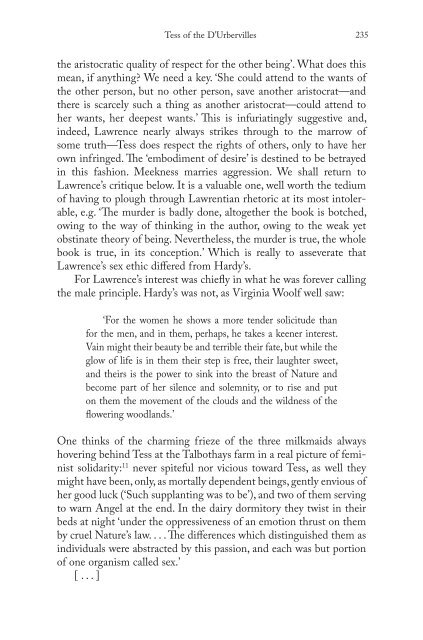Bloom's Literary Themes - ymerleksi - home
Bloom's Literary Themes - ymerleksi - home
Bloom's Literary Themes - ymerleksi - home
You also want an ePaper? Increase the reach of your titles
YUMPU automatically turns print PDFs into web optimized ePapers that Google loves.
Tess of the D’Urbervilles 235<br />
the aristocratic quality of respect for the other being’. What does this<br />
mean, if anything? We need a key. ‘She could attend to the wants of<br />
the other person, but no other person, save another aristocrat—and<br />
there is scarcely such a thing as another aristocrat—could attend to<br />
her wants, her deepest wants.’ This is infuriatingly suggestive and,<br />
indeed, Lawrence nearly always strikes through to the marrow of<br />
some truth—Tess does respect the rights of others, only to have her<br />
own infringed. The ‘embodiment of desire’ is destined to be betrayed<br />
in this fashion. Meekness marries aggression. We shall return to<br />
Lawrence’s critique below. It is a valuable one, well worth the tedium<br />
of having to plough through Lawrentian rhetoric at its most intolerable,<br />
e.g. ‘The murder is badly done, altogether the book is botched,<br />
owing to the way of thinking in the author, owing to the weak yet<br />
obstinate theory of being. Nevertheless, the murder is true, the whole<br />
book is true, in its conception.’ Which is really to asseverate that<br />
Lawrence’s sex ethic differed from Hardy’s.<br />
For Lawrence’s interest was chiefly in what he was forever calling<br />
the male principle. Hardy’s was not, as Virginia Woolf well saw:<br />
‘For the women he shows a more tender solicitude than<br />
for the men, and in them, perhaps, he takes a keener interest.<br />
Vain might their beauty be and terrible their fate, but while the<br />
glow of life is in them their step is free, their laughter sweet,<br />
and theirs is the power to sink into the breast of Nature and<br />
become part of her silence and solemnity, or to rise and put<br />
on them the movement of the clouds and the wildness of the<br />
flowering woodlands.’<br />
One thinks of the charming frieze of the three milkmaids always<br />
hovering behind Tess at the Talbothays farm in a real picture of feminist<br />
solidarity: 11 never spiteful nor vicious toward Tess, as well they<br />
might have been, only, as mortally dependent beings, gently envious of<br />
her good luck (‘Such supplanting was to be’), and two of them serving<br />
to warn Angel at the end. In the dairy dormitory they twist in their<br />
beds at night ‘under the oppressiveness of an emotion thrust on them<br />
by cruel Nature’s law. . . . The differences which distinguished them as<br />
individuals were abstracted by this passion, and each was but portion<br />
of one organism called sex.’<br />
[ . . . ]
















